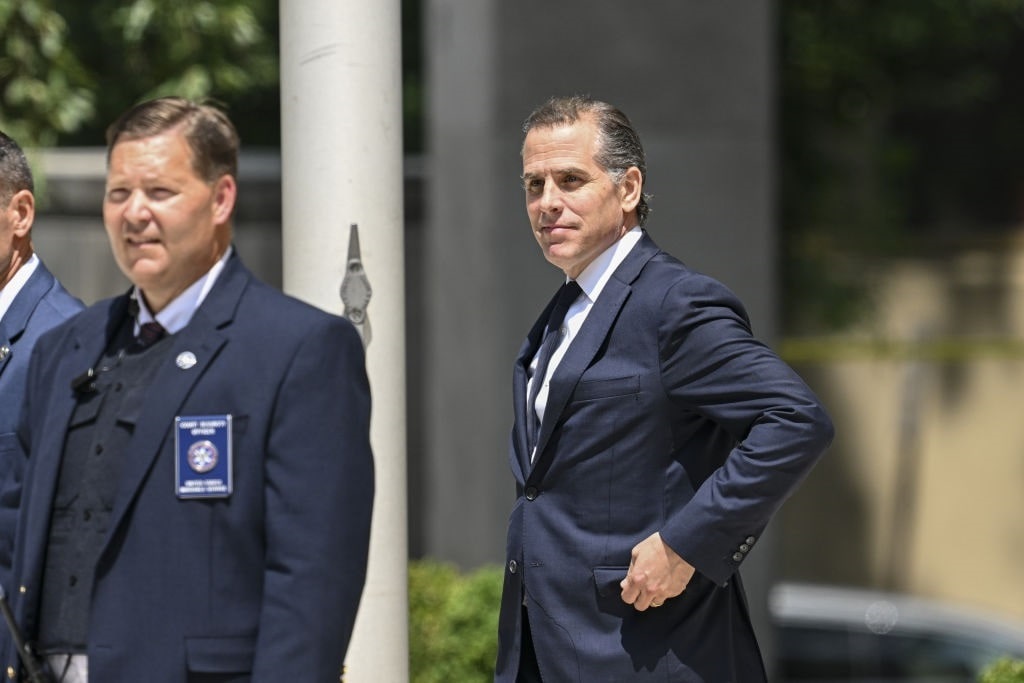The money, the drugs, the wine, and the women – but the taxman wasn’t invited to the party.
Hunter Biden found himself in significantly deeper legal trouble on December 7, when a grand jury indictment was filed in the US District Court for the Central District of California. The younger Biden is charged with nine counts relating to federal tax crimes. The charges include willfully failing to file and pay taxes, falsifying tax returns, and evading tax assessment from 2016 to 2019. Biden allegedly engaged in a four-year “scheme to not pay taxes,” and the indictment details a pattern of money being paid to business entities owned or co-owned by Hunter Biden and then moved around to other firms and distributed to various other unnamed individuals. Additionally, the court filing describes Biden’s lavish – one might say hedonistic – lifestyle during these years:
“Between 2016 and October 15, 2020, the Defendant spent this money on drugs, escorts and girlfriends, luxury hotels and rental properties, exotic cars, clothing, and other items of a personal nature, in short, everything but his taxes.”
The “introductory allegations” made in the indictment of Hunter Biden are summarized in list-form:
“The Defendant:
- subverted the payroll and tax withholding process of his own company, Owasco, PC by withdrawing millions from Owasco, PC outside of the payroll and tax withholding process that it was designed to perform;
- spent millions of dollars on an extravagant lifestyle rather than paying his tax bills;
- in 2018, stopped paying his outstanding and overdue taxes for tax year 2015;
- willfully failed to pay his 2016, 2017, 2018, and 2019 taxes on time, despite having access to funds to pay some or all of these taxes;
- willfully failed to file his 2017 and 2018 tax returns on time; and
- when he did finally file his 2018 returns, included false business deductions in order to evade assessment of taxes to reduce the substantial tax liabilities he faced as of February 2020.”
While no other individuals are named in the indictment, a lot of the information contained therein meshes closely with what House Republicans have been describing over the past months during their investigation of the Biden family business dealings.
Hunter Biden – Big Earner, Big Spender

Hunter Biden (Photo by Celal Gunes/Anadolu Agency via Getty Images)
Sometime around April of 2014, Hunter Biden was invited to join the board of directors of the Ukrainian energy business Burisma Holdings Limited. He remained with the company until around April 2019. According to the indictment, Burisma paid him approximately $1,002,016 in 2016, $630,556 in 2017, $491,939 in 2018, and $160,207 in 2019. Interestingly, the court document notes that the initial agreement was for an annual salary of approximately $1 million, which was halved in March 2017. The fact that Burisma cut Biden’s salary by 50% just two months after Joe Biden’s time as US vice president ended lends credence to the suspicion – and, indeed, the alleged claim by Burisma’s owner – that Hunter Biden was hired specifically to “protect [Burisma], through his dad, from all kinds of problems.”
In late 2015, Hunter Biden and someone identified only as “Business Associate 1” agreed to help a Romanian “businessperson” fight some bribery charges. The indictment alleges that, between November 2015 and May 2017, an entity belonging to Business Associate 1 received $3,101,258 in payments from this unidentified Romanian. This money was divided more or less equally between Hunter Biden, Business Associate 1 and “Business Associate 2.”
Also in 2017, Biden and Business Associate 1 began working on a project with CEFC China Energy Co Ltd. Around March 1, 2017, the firm of Business Associate 1 was paid approximately $3 million by State Energy HK, an entity associated with CEFC. One million dollars of that went to Hunter Biden, who then directed “a portion of those million dollars” to Business Associate 3.
More financial transactions from Chinese and US domestic entities are detailed, with money flowing to other business concerns operated by Hunter Biden. They run into the millions of dollars. As laid out in the indictment, his total gross income was “in excess of $1.5 million in 2016, $2.3 million in 2017, $2.1 million in 2018, $1 million in 2019 and approximately $188,000 from January through October 15, 2020.”
For the four years in question, the court filing contains a “summary of approximate expenditures that the Defendant made instead of paying his taxes.” The list itemizes various categories of spending, among which are “ATM/Cash Withdrawal,” “Payments – Various Women,” “Telephone/Utilities,” “Adult Entertainment,” and “Misc. Retail Purchases.” The total for these years combined comes out to $4,907,813.
Playing the Victim
Meanwhile, and apparently true to form, Hunter Biden played the victim card during a recent podcast appearance as he faces off with House Republicans over their subpoenaing of him for a closed-door transcribed testimony.
“They are trying to destroy a presidency,” he claimed. “And so, it’s not about me. In their most base way, what they’re trying to do is they’re trying to kill me, knowing that it will be a pain greater than my father could be able to handle. And so, therefore, destroying a presidency in that way.”
Biden’s attorney has demanded a public testimony as a condition to his appearance on Capitol Hill. House Oversight Committee Chairman James Comer (R-KY) has already agreed to let Hunter Biden testify in public, but only after he appears for the closed-door session, which is standard practice in the case of an individual being investigated by Congress. Trump associate Steve Bannon made a similar demand when Democrats subpoenaed him. That request, for an initial public testimony, was denied and Democrats held Bannon in contempt of Congress when he didn’t show up. Republicans have threatened Hunter Biden with the same fate. The commander-in-chief’s son has now twice refused to comply with the subpoena.

